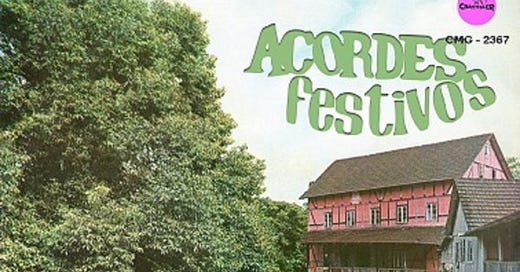EVERY GENRE PROJECT - September 18 - Bandinha
Genre of the Day - Bandinha 🇧🇷
Album of the Day - Acordes festivos by Krüger e Vogel Sanger (1965)
The late, great Ryuichi Sakamoto of Yellow Magic Orchestra early-electronica fame thoughtfully noted amidst the rise of Myspace that the Internet marked a new time of tribal, collective spaces in music consumption. He pointed out that we often forget the way we share music as humans has only been radically different for a century; “in the old days people shared music, they didn't care who made it; a song would be owned by a village and anyone could sing it, change the words, whatever.” I feel that this idea goes hand in hand with instrumental lineups as in today’s genre—certain arrangements of instruments and particular melodic strains continually act as symbols of community, institutionalized as a form of local lifeblood.
The research pickings for many of these articles can be slim, but today’s Brazilian posed a particular challenge as it was extremely hard to find any sources covering the phenomenon aside from RateYourMusic. Perhaps, then, this will be a brief article. Lately, I’ve been appreciating the eye-roll-inducing (as a maximalist, if my oft-unwieldy sentences didn’t tip you off) the adage “less is more.” I was, for a brief time, enrolled in a Songwriting I class with a professor who I believe ultimately has good intentions, but ultimately came across frustratingly pretentious and unwelcoming in his approach. Something in me snapped today and I dropped the class despite its minimal workload. I experience different modes of musical expression via this blog every day, and there’s a plethora of online resources to help me sharpen my own—provided I hold myself accountable to use ‘em. However, one of his lessons I’ll take away is that songwriting is not a form of retaining control, but an exercise in surrender—you have to shrink down big ideas and scrambled thoughts into relatively few words to maximize their universal impact. That’s something I’m evidently unfamiliar with.
What does that have to do with bandinha? Not much, other than there may be less to say than on other days. In terms of understanding Brazil’s rich and varied history, though, bandinha is an excellent microcosm. Most Brazilian musical traditions we’ve seen from jongo to samba rock help trace the rich musical pathways of Afro-Brazilian culture. Bandinha is a glimpse into another part of Brazilian history in the waves of 19th-century European immigration parallel to the US. After Brazil gained independence—though it was now the Empire of Brazil—Emperor Dom Pedro I sought to cultivate the south’s rich farmland. Brazilian music fans’ constant Twitter refrain of “come to Brasil”—and at every concert, they show why it’s worth it to do so—was an equally magnetic call for German immigrants, evidently, who came in droves in the 1820s to settle on the hectares of land in Rio Grande do Sul promised by the emperor. In cities like Novo Hamburgo (have you ever wanted to visit a place simply for the name?), little German bands known as bandinhas alemãs arranged traditional polka in brass instruments and accordions for ballrooms. The genre has continually maintained popularity and evolved in the context of new Brazilian strains, gaining romantic overtones and cross-genre instrumentation over the decades.
Today’s album, though, still focuses on the core brass and accordion that define German polka and bring me back to Sakamoto’s quote—certain genres of music reaffirm people’s belief in persistent shared traditions even as wider cultural tides shift. As always, the situational tragedy of not being able to experience bandinha on the ballroom dance floor as intended abstracts some of its impact, but this album’s jovial horn and accordion melodies that figure similarly to mariachi and hambo still shine through. “Alexandre Barone” twirls, grazing raucousness but not quite getting there, punctuated by low tuba and a pleasant rhythmic tap. Most songs feel wholly celebratory, though occasional minor-key moments add melodic nuance that recalls xaxado, Brazil’s banditry music. Brazil’s unparalleled percussive dedication is evident on the tight and purposeful “Sururu Na Gafiera,” representing the subtle and delightful fusions of musical cultures that from abroad might look disparate, but slot in perfectly down in Rio Grande do Sol.




